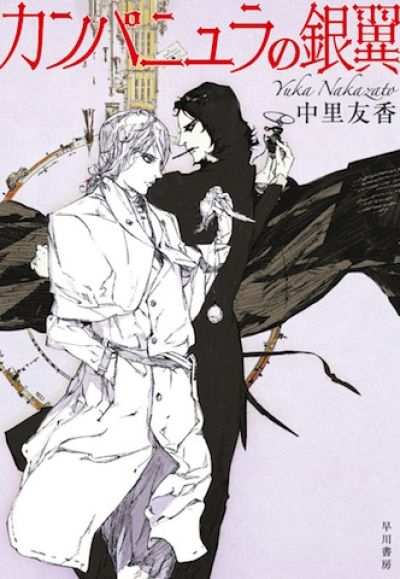Obsessive love in the Jazz Age
Silver Wings of the Campanula
By Yuka Nakazato

31 Dec, 2014
0 comments
Apparently this is the week for novels about obsessive love and survival past death. Which I guess is appropriate for the final week of the year.
Yuka Nakazato’s Silver Wings of the Campanula takes us to 1928 Oxford, where Andrew Borden is a diligent, if reclusive, student who plans make the best of the access to higher learning that a family fortune makes possible. In Paris, Andrew Borden is also a hopelessly addicted degenerate who, thanks to the same family fortune, is conducting an informal scientific experiment: will the ample supply of illegal drugs to be obtained in Paris kill him before syphilis does? Hmmm.
Sadly for the Borden family, the Andrew in Paris is the genuine article. The “Andrew Borden” in Oxford is actually Elliott Fossey, who agreed to pose as Andrew because there was no other way he could afford to go to Oxford. The Bordens get to salvage their worthless son’s reputation and Elliott gets an education, if not a degree.
Elliott soon discovered that there was a second, far more important, benefit to assuming Andrew’s identity. Elliott has come to love Andrew’s sister Kristine — not as a lover, but as a brother (if an obsessive one), Kristine accepts that Elliott is who he says he is, that is, Andrew. Kristine’s acceptance may be due to her near-total blindness (the result of an accident). Or perhaps it isn’t.
Drugs and STDs finally settle the race. With the real Andrew dead, the Bordens have no further use for Elliott. Rather than live without his beloved sister, Elliott reveals the masquerade to Kristine. They run off together so that they can continue being brother and sister.
The Bordens are very rich, so it is to be feared that Elliott and Kristine have poor odds of successfully evading the family1. When the mysterious Sigmund Vertigo offers to help them, Elliott has little choice but to accept the assistance.
This may be a very bad decision on Elliott’s part, as the wealthy Sigmund has a back-story far more twisted than Elliott and Kristine’s. He is the mysteriously ageless product of an incestuous affair between his father and his sister-mother Margarete-Anna. Sigmund was further doomed to watch his mother’s next obsessive love affair, one that left her and her lover Benedict Jongen bleeding to death. That would be bad enough but, as the ageless Sigmund discovers to his great distress, Margarete-Anna’s second affair isn’t over. Benedict refuses to stay dead and each one of his reappearances ends with the tragic death of someone close to Sigmund.
Since the ageless Sigmund has become something of a recluse over the decades, the only people close to him now are Elliott and of course the already tragic heroine, Kristine.…
I am going to assume that it’s by authorial choice, not coincidence, that Margarete-Anna and her father, actually connected by ties of blood, were doomed lovers, and that Elliott and Kristine, without any blood ties whatsoever, genuinely love each other like brother and sister. (Elliot is supportive of Kristine’s relationship with Elliott’s fellow student Thomas Collette.) In this author’s world, families by choice seem to do a lot better than families by the happenstance of mere kinship. Note that:
- The Bordens don’t come off all that well, but the Vertigos are much, much worse.
- Elliott and Kristine are better siblings than Andrew and Kristine ever were.
- The family Sigmund grudgingly forms with Elliott and Kristine is a lot less destructive than the family he was actually born into.
(Or it would be if not for the fact that by adopting the pair, Sigmund painted a bright target on them. And when I say them, really, does anyone think Benedict won’t immediately gravitate to Kristine?)
I wanted to like this more than I actually did. I don’t think the issue is Matt Treyvaud’s translation, which to my eye looked more transparent than is typical of translated works. It may be that I am too low-brow to be the intended audience for this, because every time Elliott and Sigmund began to discuss philosophy my eyes glazed over. I’ve noticed something similar with other works of Japanese speculative fiction; until now I called the phenomenon the “Masamune Shirow Effect.”
The eventual explanation of Benedict’s true nature was, um, a lot more supernatural than I was expecting. Sigmund’s extended lifespan had been explained away with (very dubious) Science! However, I was amused by the way that the main characters turn Benedict’s very nature against him. This plot twist was very science fictional, as they are taking advantage of tactics that would have been impossible only a few years earlier.
This won the 2012 Agatha Christie Award for New Writers and will be available from Bento Books.
1: Although it is not clear to me that the Bordens particularly minded or even noticed Kristine’s disappearance.
